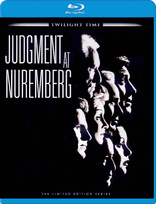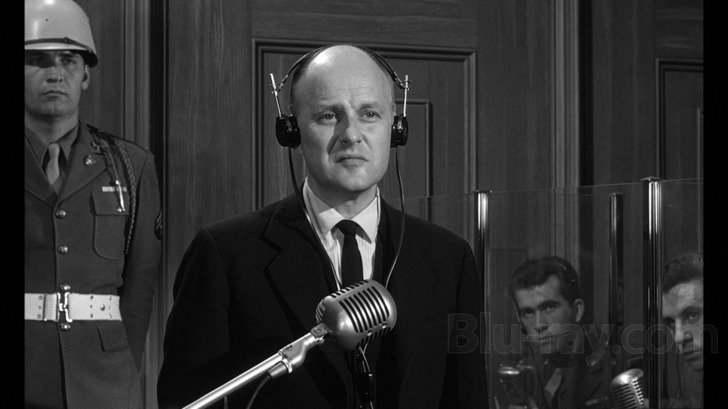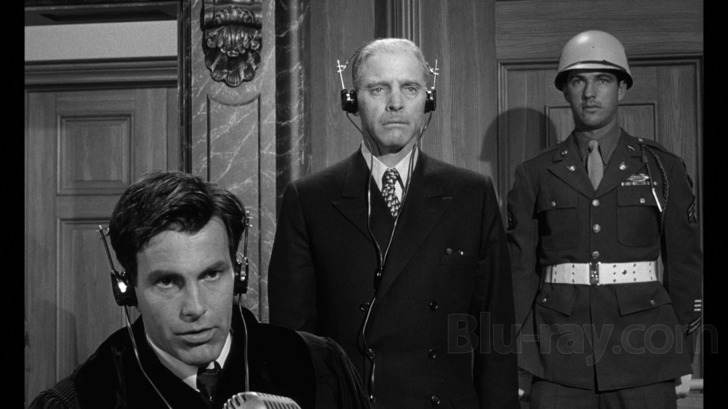Judgment at Nuremberg Blu-ray Movie
HomeJudgment at Nuremberg Blu-ray Movie 
Limited Edition to 3000 - SOLD OUTTwilight Time | 1961 | 190 min | Not rated | Nov 11, 2014

Movie rating
8.1 | / 10 |
Blu-ray rating
| Users | 0.0 | |
| Reviewer | 4.5 | |
| Overall | 4.5 |
Overview
Judgment at Nuremberg (1961)
In 1948, an American court in occupied Germany tries four Nazi judges for war crimes and crimes against humanity.
Starring: Spencer Tracy, Burt Lancaster, Richard Widmark, Marlene Dietrich, Maximilian SchellDirector: Stanley Kramer
| History | Uncertain |
| Drama | Uncertain |
Specifications
Video
Video codec: MPEG-4 AVC
Video resolution: 1080p
Aspect ratio: 1.66:1
Original aspect ratio: 1.85:1
Audio
English: DTS-HD Master Audio 5.1 (48kHz, 24-bit)
English: DTS-HD Master Audio Mono (48kHz, 24-bit)
Music: DTS-HD Master Audio 5.1 (48kHz, 24-bit)
Subtitles
English SDH
Discs
50GB Blu-ray Disc
Single disc (1 BD)
Playback
Region free
Review
Rating summary
| Movie | 4.5 | |
| Video | 4.5 | |
| Audio | 4.5 | |
| Extras | 3.0 | |
| Overall | 4.5 |
Judgment at Nuremberg Blu-ray Movie Review
A newsreel is worth a thousand words.
Reviewed by Jeffrey Kauffman November 20, 2014Guilt may be collective, but is responsibility? That’s a potent subtext in Stanley Kramer’s acclaimed Judgment at Nuremberg, a film which in 1961 probably still felt as if it had been “ripped from the headlines,” though the actual Nuremberg Trials were more than a decade distant by that time. Anyone who visited Germany in the initial decades after World War II would probably agree that the general German population was wracked with guilt over their country’s activities during World War II, specifically with regard to the Holocaust and related side issues like eugenics. When I lived in Germany for a summer as a teenager back in the Dark Ages, I regularly encountered German adults who had probably been mere children during World War II who resolutely refused to even acknowledge things like the location of some of the concentration camps. It somehow felt that this wasn’t pure denial but an avoidance mechanism meant to protect themselves from the psychological trauma of having to confront the almost genetic guilt they felt. And yet at the same time it would be foolhardy to ascribe personal responsibility to many of these same people, some of whom were, as stated, mere children when the horrors unfolded. And so, that question again: guilt may be collective, but is responsibility? Judgment at Nuremberg had originally aired on television as an entry in the popular Playhouse 90 series, and then followed in the footsteps of such other television to film adaptations like 12 Angry Men with a somewhat broader canvas. Kramer was a famous purveyor of so-called “message” films, and in this case, the message is delivered in an incredibly verbose manner that some may find too talky for its own good. Despite the fact that the film is largely a series of chattering heads, there’s substantial drama at hand as a number of German officials and everyday citizens are called to testify in a court trying to come to terms with the very question posited above.

Spencer Tracy portrays Judge Dan Haywood, the kind of decent, unpretentious American whose common sense approach might actually bring order to an inherently chaotic situation. Ironically, Haywood is tasked with overseeing a trial largely about judges, albeit German in this case. Almost right off the bat, scenarist Abby Mann (adapting his own original Playhouse 90 version) and Kramer are not shy about offering personifications of various ideas and indeed ideals. Haywood has to come to terms with the fact that a quartet of German judges has been responsible for untold hundreds, even thousands, of deaths and other scurrilous judicial maneuverings. But that brings up one basic fact that defense attorney Hans Rolfe (Maximilian Schell, an Oscar winner for this performance) mentions, in what boils down to a somewhat high- falutin’ version of “they were only following orders.” And it’s in those orders, that codified German set of laws, that Haywood (obviously the audience’s surrogate and the tool with which Mann and Kramer build their point) has to begin examining how much the German people knew and when they knew it.
That allows Mann to offer several other personifications of various types on both sides of the legal battle. There’s an elegant, somewhat unctuous, former Nazi named Emil Hahn (Werner Klemperer) who seems almost proud of his legacy. But there’s a somewhat taciturn, even doleful, former judge and doctor named Ernst Janning (Burt Lancaster) who may finally be coming to terms with the havoc his decisions have wreaked, not just for certain individuals but for his country. On the flip side are those who suffered under the whims of folks like Hahn and Janning, including a frightened housewife (Judy Garland, Academy Award nominated) who had a forbidden relationship with a Jew, and a simpleminded man (Montgomery Clift, also Academy Award nominated) forced to undergo sterilization as part of Germany’s vaunted eugenics policies.
Mann significantly expanded his original teleplay for this film version, opening things up (though truth be told, this is still a fairly claustrophobic experience) and providing Haywood an opportunity to mix and mingle with various Germans, including a widow (Marlene Dietrich) who tries to urge the judge to be gentle with a wounded populace. The gallivanting American prosecutor Colonel Lawson (Richard Widmark) will have none of it, of course, and is out for what he perceives to be absolute justice.
That ultimately brings the film to what is arguably its most profound moment, and ironically it’s one that eschews at least some of the florid talkiness that is otherwise Judgment at Nuremberg’s main approach. Lawson has the assembled multitudes watch the horrifying film of concentration camps being liberated, with the attendant horrors of stacked corpses, near dead prisoners and a variety of disgusting other footage that is hard to watch even now, seemingly so far removed from the actual events. Yes, it plays out to Lawson's similarly sickening recitation of various other horrors Nazis inflicted, but it's a uniquely visceral sequence from a purely visual standpoint. It’s also a fait accompli from an emotional standpoint, but it’s interesting to see how Mann weaves that gut punch into a larger, more legal, context. It's also notable that while this is arguably the most devastating sequence in the film, it comes not at the climax, but more toward the midway of what is a more or less three hour running time.
For such a largely courtroom bound piece, Kramer keeps things moving, both literally and figuratively. Working with cinematographer Ernest Laszlo, Kramer often utilizes almost sinuous tracking and dolly shots to encircle various characters. One bit of artistic license is taken which may be temporarily problematic but which is understandable in the long run. At the beginning of the film, the Germans speak in German, with translators providing English interstitials. Midway through Rolfe’s opening statement, which is in German, Kramer zooms into Schell as the language ports over to English for the rest of the film.
The film actually does ultimately answer whether responsibility is collective, though largely with regard to the Janning character and his view of German society. Haywood attempts to reconcile a seemingly polite, well educated and well meaning German public with the fact that many of them at best stood idly by while various atrocities were committed. But Janning, himself inarguably culpable and also buffeted by the denying behavior of some of his fellow defendants, finally realizes that without personal responsibility, there can be no salvation and history may repeat itself (in fact, Janning gives a blistering denunciation of Rolfe's defense efforts, comparing them to warmed over Nazi ideology).
It’s possible to argue that Kramer flirts with a certain degree of excess here, at least with regard to what might be a somewhat padded running time. But Mann’s script is so artfully literate and insightful, it’s easy to simply luxuriate in ideas being so thoughtfully presented, at times poignantly, at other times near violently. Judgment at Nuremberg is ultimately a cathartic experience, and sometimes a good catharsis can take a little time.
Judgment at Nuremberg Blu-ray Movie, Video Quality 

Judgment at Nuremberg is presented on Blu-ray with an AVC encoded 1080p transfer in 1.66:1. Elements are in very good condition, with only minimal specks showing up. The bulk of this presentation offers a nicely clear and sharp picture, with beautiful contrast detailing rich blacks and well modulated gray scale. Some of the second unit footage in and around Nuremberg may be just slightly softer than the courtroom and other interior scenes, but it's a negligible difference at best. Grain is nicely organic looking and has obviously not been digitally scrubbed. There are similarly no issues with digital sharpening or compression artifacts.
Judgment at Nuremberg Blu-ray Movie, Audio Quality 

Judgment at Nuremberg features a DTS-HD Master Audio Mono mix recreating the film's original sound presentation, as well as a surprisingly well done DTS-HD Master Audio 5.1 repurposing. There's some excellent attention paid to directionality throughout the surround presentation, with dialogue, effects and Ernest Gold's score spilling through discrete channels. What's notable about this mix is how it introduces surround activity quite subtly in scenes where one might not think much would be available, like some of the monologues that fill various trial scenes. Fidelity is excellent and there are no issues of any kind to cause concern.
Judgment at Nuremberg Blu-ray Movie, Special Features and Extras 

- In Conversation with Abby Mann and Maximilan Schell (480i; 19:38) is an enjoyable reminiscence by the pair.
- The Value of a Single Human Being (480i; 6:03) offers Mann talking about his screenplay.
- A Tribute to Stanley Kramer (480i; 14:27) is a generalist overview of some aspects of Kramer's life and career, with interviews with his widow.
- Original Theatrical Trailer (1080p; 3:00)
- MGM 90th Anniversary Trailer (1080p; 2:06)
- Isolated Score Track is presented in DTS-HD Master Audio 5.1.
Judgment at Nuremberg Blu-ray Movie, Overall Score and Recommendation 

Judgment at Nuremberg is an unusually intelligent film, but that doesn't mean it's lacking passion. For such a relentlessly talky feature, Judgment at Nuremberg is often an emotionally draining experience, one that manages to address a whole host of almost Freudian issues of guilt and complicity within the strictures of an international court proceeding. Kramer is able to invest this piece of sociopolitical psychology with surprising style, with an appealingly fluid camera that helps to invest an at times dialectical debate with a lot of visual interest. Technical merits are first rate, and Judgment at Nuremberg comes Highly recommended.
Similar titles
Similar titles you might also like

Labyrinth of Lies
Im Labyrinth des Schweigens
2014

Bridge of Spies
2015

The Court-Martial of Billy Mitchell
One Man Mutiny | Special Edition
1955

Never Look Away
Werk ohne Autor
2018

The Mortal Storm
Warner Archive Collection
1940

Breaker Morant
1980

Emperor
2012

Inherit the Wind
1960

The Ipcress File
1965

Che!
Limited Edition to 3000
1969

Funeral in Berlin
1966

Missing
1982

The Good Shepherd
2006

Johnny Belinda
1948

Woman in Gold
2015

Footsteps in the Fog
1955

The Good German 4K
2006

Boomerang
1947

All My Sons
1948

The Atomic City
1952
